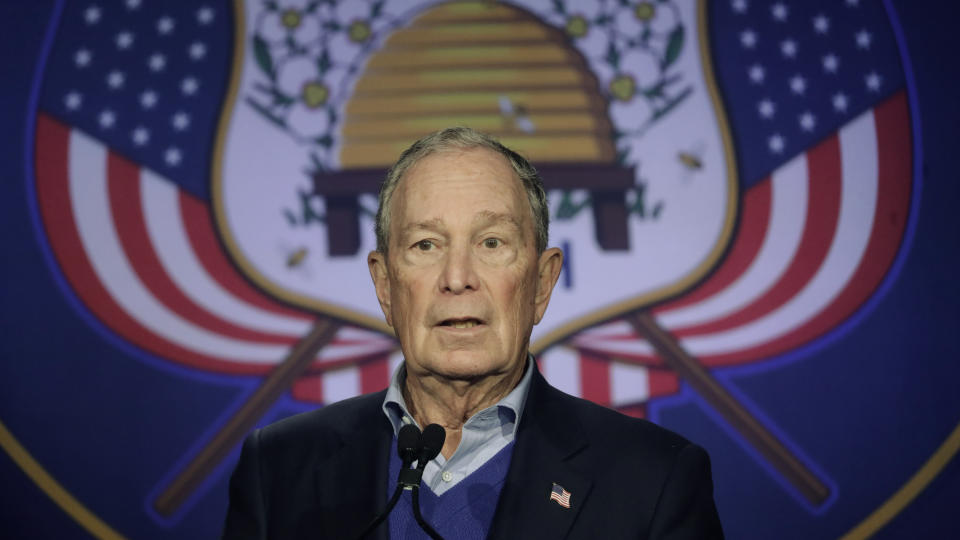Bloomberg’s billionaire campaign is working
He’s a latecomer. An interloper. A carpetbagger. If Mike Bloomberg weren’t richer than god, nobody would be paying any attention to him.
But people are paying attention to Bloomberg, and it’s clearly because of his money. It should be a travesty. But maybe it’s not.
The former New York City mayor has risen from nothing to 10% percent of the vote in Morning Consult’s latest poll of Democratic primary voters, putting him in fourth place behind Joe Biden, Bernie Sanders and Elizabeth Warren. Bloomberg is still not close to Biden, the front-runner, but he has surpassed candidates such as Pete Buttigieg and Amy Klobuchar, who have been campaigning for months.
Bloomberg is dwarfing the spending of everybody else in the race—including President Trump. The New York billionaire has bought at least $217 million in ad spending so far, compared with $116 million for all the other Democrats combined, except for Tom Steyer, who has spent $143 million of his own money on his campaign. Trump has spent $50 million.
Bloomberg has also suggested he’ll spend $1 billion or more to defeat Trump this year, whether on his own campaign or on behalf of whoever the Democrats end up nominating. That would be 23% more than every donor combined spent on Hillary Clinton’s campaign in 2016, and 55% more than all Trump donors spent, combined. In short, Bloomberg, worth about $55 billion, brings a transformative amount of money to the race.
Private money is basically required to win a national election
Is this okay? Or appalling? It’s arguably both, given that private money is an unfortunate constant in American politics and a de facto requirement for winning national races. Since the 2010 Citizens United Supreme Court decision opened the donor floodgates, rich donors have poured money into super PACs and other groups that help tilt elections.
Several Democrats, including Bernie Sanders and Elizabeth Warren, are trying to buck that trend this cycle, relying solely on small-dollar donations. But that would put each at a huge disadvantage to Trump, who is accepting corporate funding and other large donations. Warren has raised big money before, and is a recent convert to small-donor funding. Sanders has more consistently rejected big money, but he’s also a far-left candidate likely to have the hardest time beating Trump if he becomes the Democratic nominee.

So it’s a questionable tactic for Warren and Sanders to play by rules they wish were in place, instead of playing by the rules that actually exist. A self-funded Bloomberg candidacy is one antidote to rich-donor funding, since Bloomberg isn’t beholden to kingmakers controlling his purse strings. That’s the same argument Trump made during the 2016 primary election, which he largely funded himself, although Trump flipped to the rich-donor model during the general election and is still sticking with that.
It’s obviously not a satisfying solution to rely on rich, self-funding candidates to counteract the influence of robber-barons backing puppet politicians. A better solution might be public funding of campaigns, or other limits on fundraising or spending that force candidates to focus more on substance and less on appeasing rich donors.
[Check out our Ballots & Dollars podcast on Apple and Google.]
But we’re nowhere near such reforms, and the ugly reality is that the best-funded candidates are more likely to win. Bloomberg hasn’t said much publicly about Citizens United, but a spokesperson for his campaign tells Yahoo Finance that Bloomberg believes the 2010 Supreme Court decision was a mistake he’d work to fix. “Mike will take action to create a progressive public campaign-finance system, strengthen lobbying and ethics regulations, get rid of dark money, and end campaign contributions and expenditures by corporations controlled or influenced by foreign nationals,” the spokesperson said in an email.
Bloomberg’s stance is similar to Warren’s plan to clean up Washington and reduce the influence of corporate money. Sanders and Warren seem to despise billionaires, and they might gag on a Bloomberg victory. But Sanders and Warren only represent one faction of the Democratic party. Another faction would be fine with a business-friendly Bloombergian nominee able to win some swing voters and beat Trump.
Biden is still the best bet to win the Democratic nomination, and if he does beat Bloomberg and the others, with so-so fundraising, it would prove money doesn’t always buy elections. If Biden does win, and Bloomberg offers to help fund his bid to oust Trump from the White House, Biden would almost certainly welcome it. Trump would surely accept help from any billionaire who offered it.
Rick Newman is the author of four books, including “Rebounders: How Winners Pivot from Setback to Success.” Follow him on Twitter: @rickjnewman. Confidential tip line: [email protected]. Encrypted communication available. Click here to get Rick’s stories by email.
Read more:
Read the latest financial and business news from Yahoo Finance
Follow Yahoo Finance on Twitter, Facebook, Instagram, Flipboard, SmartNews, LinkedIn, YouTube, and reddit.
